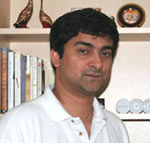Contribute
| Shiladitya Sengupta Wins DOD's 2006 Era Of Hope Scholar Award |
Anil Saigal
01/07/2007
Dr. Shiladitya Sengupta, an Assistant Professor of Medicine at the Harvard-MIT division of Health Sciences and Technology is among three winners of the ‘Era of Hope Scholar Award, 2006’ given by the breast cancer research programme of DoD. The award recognizes talented, early-career scientists who have demonstrated that they are the best in their field through creativity, vision, and productivity.
Dr. Sengupta also hold the position of Associate Bioengineer at Brigham and Women's Hospital. His laboratory focuses on developing engineering solutions for complex diseases by integrating fundamental biology with nano and microscale engineering. His recent work brought together cancer biology, pharmacology and engineering to create an anti-cancer drug delivery device dubbed the nanocell. The technology has the potential to eliminate the systemic toxicity caused by chemotherapy by directing drugs to act only where they are needed. The $4.1 million award will help him continue this research and devlop innovation global health solutions.
During his stint as a post-doctoral associate at MIT, Dr. Sengupta worked on bringing together the concepts of angiogenesis (formation of blood vessels) and nanotechnology to enable hybrid applications in the field of drug delivery. He received the prestigious TR35 Innovator award for one of his biggest innovations, the "nano-cell". This device consists of a lipid sphere about 200 nanometers wide surrounding smaller, biodegradable polymer spheres. These nanocells home in on cancers based on the unique characteristics of tumor blood vessels. The outer shells then dissolve, releasing a drug that destroys the vessels. As the cancer cells starve for oxygen, they secrete enzymes that break up the inner spheres, dispensing a standard chemotherapy agent. A significant aspect of this discovery is that the use of polymers and drugs already approved for human use could potentially move the innovation quicker into clinical trials. Dr. Sengupta received the Coulter Foundation Young Investigator Award in Bioengineering (2006). During his doctoral studies, he revealed how a protein that causes liver regeneration promotes blood vessel growth, and co-founded Dynamic Biosystems to turn the discovery into treatments for chronic wounds. In Decmber 2006, he received the 2006 Technovators Award from the Indian Business Club, MIT.
Dr. Sengupta received his Ph.D from University of Cambridge, UK, after having completed both his Bachelors and Masters of Science from All India Institute of Medical Sciences, India.
You may also access this article through our web-site http://www.lokvani.com/
